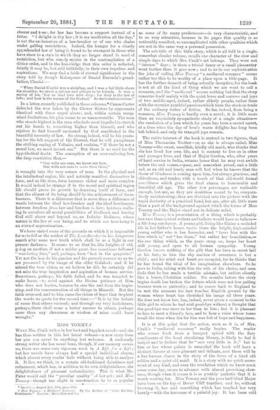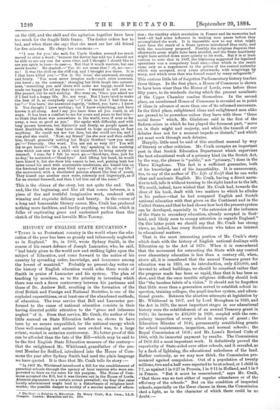MISS TO MMY.1- WHEN Mrs. Craik writes in her best
and happiest mood—and she has thus written in this her latest volume—a new story from her Pen can never be anything but welcome. A uniformly strong writer she has never been, though, if our memory serves us, there was some very vigorous work in A Life for a Life; but her novels have always had a special individual charm, which almost every reader feels without being able to analyse it. It lies, we think, in a certain old-fashioned daintiness and refinement, which has, in addition to its own delightfulness, the delightfulness of pleasant unfamiliarity. This is what Mr. Pater would call the "peculiar quality" of her art ; and Miss Tommy—though too slight in construction to be as popular • Spectator, August 2nd, 1884, page 1015.
t Miss Tommy a Medixnal Romance. By the Author of "John Halifax, Gentleman." London: Maiimillan and Cu. as some of its many predecessors—is very characteristic, and to us very attractive, because in its pages this quality is so noticeably manifest, so uncomplicated with other qualities which are not in the same way a personal possession.
The sub-title of this little story, which is all told in a singles somewhat slender volume, recalls one character of the slow and simple days to which Mrs. Craik's art belongs. They were not " intense " days ; in them a trivial fancy or a small pleasantry went further than it goes now ; and to us in our sophistication the joke of calling Miss Tommy "a medireval romance" seems rather too thin to be worthy of a place upon a title-page. It has the further demerit of being actually deceptive, for the book is not at all the kind of thing which we are wont to call a romance, and the " medimval " means nothing but that the story concerns itself mainly with the quiet loves and sorrows and joys of two middle-aged, indeed, rather elderly people, rather than with the stormier youthful passions which form the stock-in-trade of the ordinary writer of fiction. So far, indeed, from being a romance, Hiss Tommy is hardly even a novel; it is little more than an exquisitely sympathetic study of a single situation— the revelation of a love which for years has been a sacred secret, at a time when the day of love's warm delights has long been left behind, and only its tranquil joys remain.
The entire interest of the book is centred in two figures, that of Miss Thornasina Trotter—or, as she is always called, Mies Tommy—the sweet, unselfish, kindly old maid, who thinks that she has lived her own life, and is content to live on in other and younger lives, and that of Major Gordon, who, after years of hard service in India, returns home that he may rest awhile before the end comes,—poor, and somewhat proud, and a little sad, as an old and lonely man will feel when he knows that the doom of blindness is coming upon him, but always gracious, and chivalrous, and tender, with a touch of that old-world formal courtliness which gives the final charm to honourable and beautiful old age. The other few personages are realisable enough, but are, as they are doubtless meant to be, compara- tively uninteresting; they are sketched into the picture with the rapid dexterity of a practised hand, but are, after all, little more than a part of the background against which the forms of Miss Tommy and the Major stand out in delicate relief.
Miss Tonwly is a presentation of a thing which is probably less rare than cynical writers and talkers would have us believe—
a life-long constancy. A young girl, living like Elaine a secluded life in her father's house, meets there the bright, high-minded young soldier who is her Lancelot, and "loves him with the love which is," not "her doom," but rather her benediction,— the one thing which, as the years creep on, keeps her heart still young, and open to all human sympathy. Young Gordon knows nothing of the gift that has been in secret laid at his feet; to him the shy maiden of seventeen is but a
child ; and his mind and heart are occupied, for he thinks that he has found the ideal of his imagination elsewhere. So he goes to India, taking with him the wife of his choice, and soon finds that he has made a terrible mistake, but suffers silently like a brave, Christian soldier. Six months before the story begins death has broken the fetters which were not less galling because worn so patiently ; and he comes back to England to be met the moment his foot touches English ground by the woman whose heart has cherished his image all these years. He does not know her, has, indeed, never given a moment to the little girl to whom he had said good-bye without a thought that the good-bye was more to her than to him ; but it is pleasant to him to meet a friendly face, and to hear a voice whose tones recall the time when life for him was full of hope and happiness.
It is at this point that the action, such as it is, of Mrs. Craik's "mediaeval romance" really begins. The reader who comes fresh from a banquet spiced with the fiery condiments of the local circulating library, is likely to feel it insipid and to declare that he "sees very little in it ;" but to him or her whose palate is unspoiled the book will have a distinct flavour at once pleasant and delicate, and there will be a fine human charm in the story of the loves of a tired old soldier and a quiet old maid. It is a story with no quick move- ment of any kind, and even the revelation which we know must come some day, seems to advance with almost provoking slow- ness, though when it comes it is so prettily pathetic that it is worth waiting for. Miss Tommy and the poor half-blind Major have been on the top of Dover Cliff together, and he, without knowing it, has said something which has touched her very keenly—with the keenness of a painful joy.. It has been cold
on the cliff, and the chill and the agitation together have been too much for the fragile little frame. The doctor orders her to bed, and when there she says that she must see her old friend for five minutes. He obeys her summons :-
"'I sent for you,' she said, for Uncle Gordon seemed too much moved to utter a word; because the doctor has told me I should not be able to see any one for some time, and I thought I should like to see you again in case—in case—. Not that it much matters, but one never knows.' He started.—' You do not mean that ? oh, no—no- no ! It was the chill on the cliff-top, and I brought you there. It is I that have killed you.'—' Not in the least,' she answered, strongly and firmly. Yon must never imagine such—such utter nonsense, you know ; on the contrary,' changing her little laugh into earnest- ness, 'something you said there will make me happy, would have made me happy for all my days to come. I wanted to tell you so.' She paused, but he said nothing. She went on, Once you asked me if I bad had a happy life. No, not very. But I have tried to make the best of it, as everybody can.'—' I wish to God I had done so, too!'—' You have,' she answered eagerly, indeed, you have ; I know it You thought I knew nothing ; but I knew everything, and have known it all along. And I say you have done all you could, in all ways. It has been a comfort to me for years and years to feel this- -to think that there was somewhere in the world, even if ever so far away, a man so good as you.' She spoke with difficulty, and with long pauses between, but distinctly and firmly, as people speak on their deathbeds, when they have ceased to hope anything, or fear anything. He could not see her face, but she could see his, and I was glad she could. Now, my friend' (as she now and then called him, though generally nothing but Major Gordon) now you most go.'—' Presently. One word. You are not so very ill ? You will try to get better ?'—' Oh, yes, I will try,' speaking in the soothing tone which one uses to a child—not unneeded, he being utterly un- manned. I rose, for I felt he must go.—' Good-bye, then, just for to-day,' he muttered.—' Good-bye.' And lifting her hand, he would have kissed it, but she drew him nearer to her, and, putting both her arms round his neck with unutterable tenderness, she kissed him on the forehead and on the poor blind eyes.—' All my life, all my life !' she murmured, with a smothered passion almost like that of youth. They kissed one another once more, solemnly and lingeringly, as if for an eternal farewell, and then I led him out of the room."
This is the climax of the story, but not quite the end. That end, like the beginning, and like all that comes between, is a piece of fine and truthful imaginative work, rendered with winning and exquisite delicacy and beauty. In the course of a long and honourable literary career, Mrs. Craik has produced nothing more faultless, and hardly anything, we think, which is faller of captivating grace and nnstrained pathos than this sketch of the loving and loveable Miss Tommy.



































 Previous page
Previous page